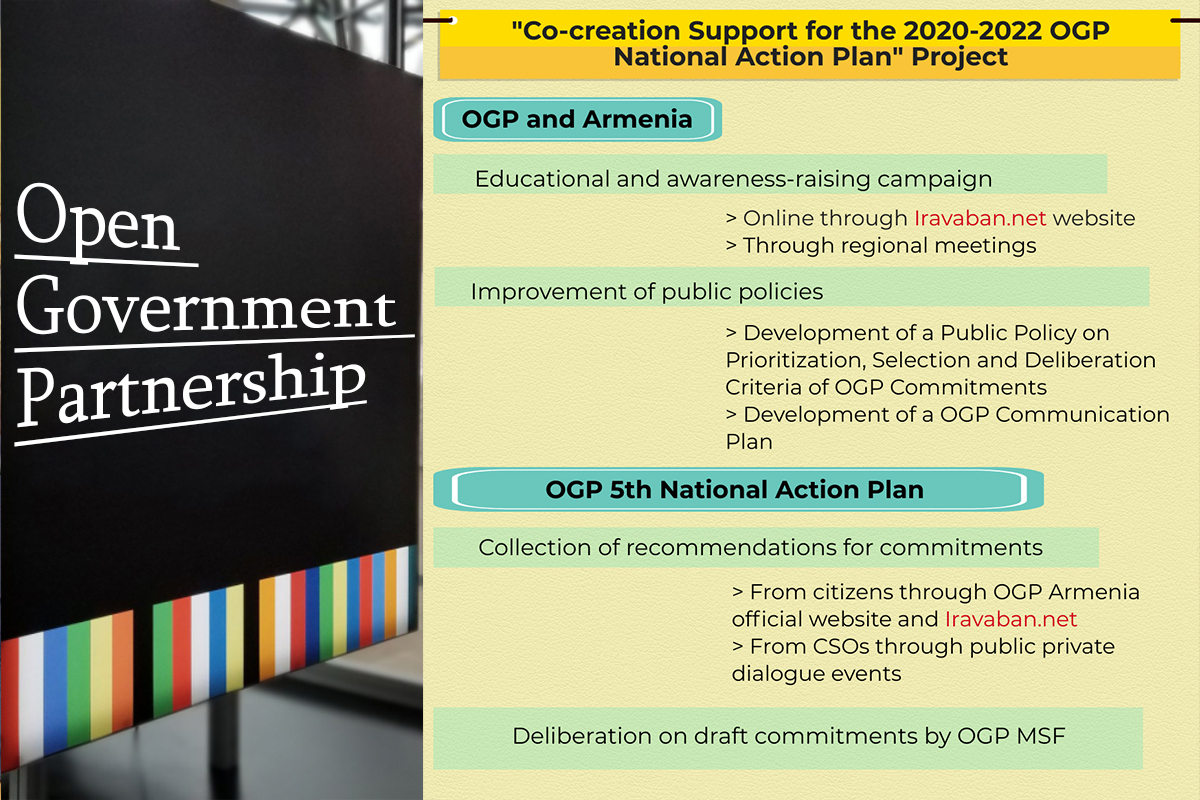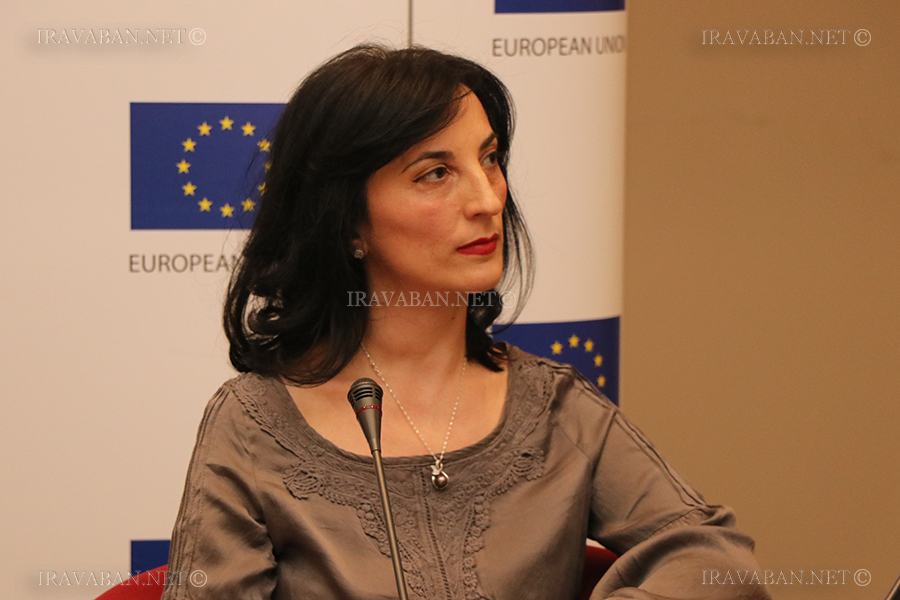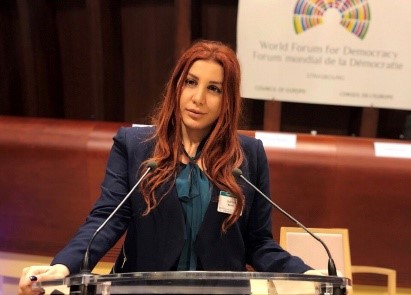
In order to support the joint development of the Fifth Open Government Partnership (OGP) Action Plan, NGOs that are members of the OGP Working Group have formed a consortium consisting of the Armenian Lawyers’ Association, the Freedom of Information Center, and led by the Armavir Development Center, having the aim to facilitate the development of an ambitious community and national commitment program to make the government more participatory, responsible and accountable.
Ms Ani Harutyunyan, representative of the Armavir Development Center NGO, told Iravaban.net about the upcoming OGP project.
“To this end, we have established a roadmap to make the process more efficient,” she said.
She mentioned the actions that had been planned to be implemented in the context of the project.
“Within the framework of the project, we will implement a number of awareness-raising measures, which will be aimed at raising awareness about the commitments of the previous action plan, on the one hand, and encouraging the collection of new proposals, which can become potential commitments for the 5th Action Plan,” Ani Harutyunyan said.
Awareness raising and collection of the proposals will be carried out through Iravaban.net website as well; articles, including infographics and video materials will be published to raise awareness.
“Within the framework of the project, we will implement a number of awareness-raising measures, which will be aimed at raising awareness about the commitments of the previous action plan, on the one hand, and encouraging the collection of new proposals, which can become potential commitments for the 5th Action Plan,” said Ani Harutyunyan.
As part of the awareness-raising activities, the Freedom of Information Center will develop a Communication Plan for the Open Government Partnership of the Republic of Armenia, which will define the Government’s mission, vision, and basic principles in the field of OGP. In other words, the document will include goals on the basis of which information and communication measures will be taken by the civil society, a multi-stakeholder group.
Shushan Doydoyan, President of the Freedom of Information Center, a member of the OGP working group, said that if the strategic communication plan would become a reality, it could have an impact on raising citizens’ awareness and promoting participation. “The project is aimed at raising public awareness of Open Government Partnership processes through all possible information channels. Of course, there is a need for awareness not only in the society, but also in the local government system, and abroad. A public awareness campaign should be carried out in all three directions with all available resources. However, funds are needed for this,” she said.
reality, it could have an impact on raising citizens’ awareness and promoting participation. “The project is aimed at raising public awareness of Open Government Partnership processes through all possible information channels. Of course, there is a need for awareness not only in the society, but also in the local government system, and abroad. A public awareness campaign should be carried out in all three directions with all available resources. However, funds are needed for this,” she said.
According to Shushan Doydoyan, the state needs such programs as the OGP. “The values of open government partnership – public participation, promotion of innovation, ensuring publicity – these are all values on which the democratic governance is based. If any of this is not properly implemented in the country, of course, there can be no effective good governance. This is a necessity, but it is another question to what extent governments take it seriously, dedicate themselves to this idea, and contribute to this process. It is taken quite seriously in Armenia, but during the last year, especially in the last quarter, the process has become passive for objective reasons. I hope the situation will improve in the coming months,” the President of FOICA said.
 Ms Mariam Zadoyan, the representative of the Armenian Lawyers’ Association, said that it was planned to collect proposals not only from citizens, but also from professional civil society structures. “To this end, online thematic discussions on public-private partnership with the participation of state bodies and member organizations of the Constructive Dialogue Network of Armenia have already been launched. Expert support is also provided in this process.”
Ms Mariam Zadoyan, the representative of the Armenian Lawyers’ Association, said that it was planned to collect proposals not only from citizens, but also from professional civil society structures. “To this end, online thematic discussions on public-private partnership with the participation of state bodies and member organizations of the Constructive Dialogue Network of Armenia have already been launched. Expert support is also provided in this process.”
“In addition, within the framework of the project, we plan to develop a public policy on the priority of proposals, selection and discussion criteria,” she said. “The main problem is that the criteria for filtering commitments and final selection are not clear. As about 100 proposals are received, it is practically impossible (and ineffective) to discuss all the proposals one by one with the members of the working group. While discussing previous action plans, it is often found that some of the proposals did not fit the OGP concept or were repeated. In addition, it is not clear whether voting should be used to make a decision or not, or in what other ways it is necessary to reach a general agreement. All these problems will be solved in case of adopting the developed order, which was elaborated taking into account the best practice, in particular, OGP participation and joint development standards and the methodology of Independent Review Mechanism. The draft also sets out the requirement to provide mandatory feedback to all stakeholders who submit proposals and apply a more systematic approach to an effective and transparent commitment selection process.”
After completing the package of proposals, deliberations on draft commitments by OGP MSF will be held, to envisage the latter in the action plan. At this stage, the action plan is presented for public discussion, the citizens can submit their proposals on the already developed program, and only after this it is subject to approval.
It should be noted that the publication has been prepared within the framework of the “Co-creation Support for the 2020-2022 OGP National Action Plan” project implemented by a consortium of 3 Non-Governmental Organizations “Armavir Development Center”, “Armenian Lawyers’ Association” and “Freedom of Information Center” with the support of the “OGP” Support Unit.
